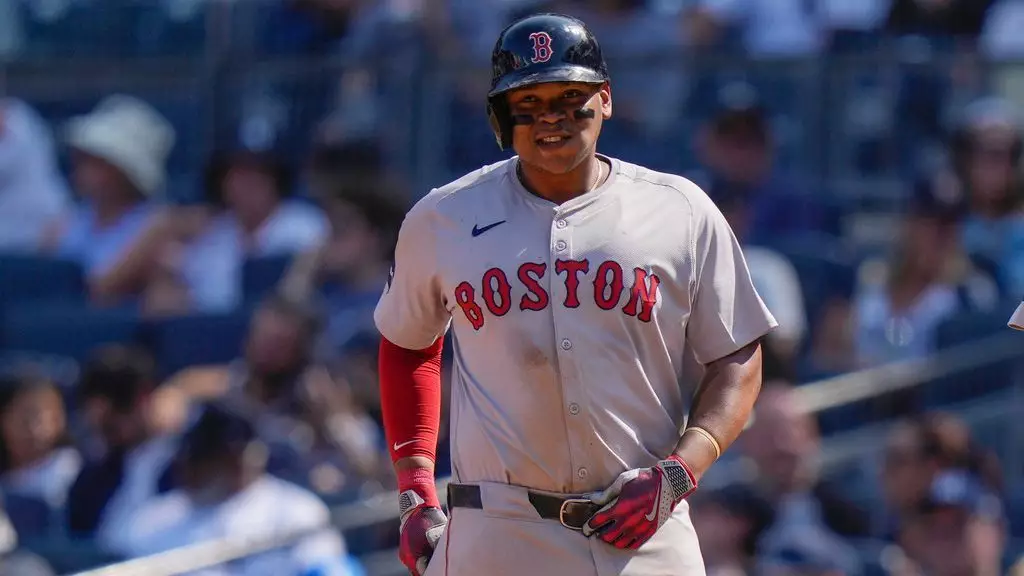The Reluctant Switch: Rafael Devers Stands Firm as the Red Sox’s DH
Stepping onto the baseball field, every player knows they are part of a bigger story—a narrative woven together by personal achievements and team dynamics. For Rafael Devers, the Boston Red Sox’s powerhouse designated hitter, this story recently took an unexpected turn. With the season-ending injury of his teammate Triston Casas, the Red Sox management broached the idea of Devers taking on a new role as first baseman. Yet, Devers has drawn a firm line in the sand, expressing his preference to remain where he feels most effective: as the team’s DH.
This situation with Devers shines a light on the intricate dance between player preferences and team strategies. For any athlete, especially one of Devers’ caliber, consistency is often key to maintaining peak performance. His reluctance to switch positions again underscores a broader theme within sports: the need for stability amidst the constant ebb and flow of team requirements. As we explore this narrative further, it’s clear that while versatility is valued, specialization holds its own weight.
The conversation around Devers’ position isn’t just about him; it’s an exploration of how professional teams function behind the scenes. Here we have an athlete who has already made significant adjustments when he transitioned from third base to DH earlier in the season. Now, faced with another potential shift, Devers stands resolute in his commitment to his current role, sparking discussions on how teams manage their rosters and respect individual player strengths.
Key Takeaways
- Rafael Devers prefers to stay as the Red Sox’s designated hitter rather than switch positions.
- Consistency and comfort are crucial for player performance and mental focus.
- Management-player communication is key in navigating positional changes within a team.
- Devers’ situation highlights larger issues in sports management regarding player specialization and team needs.
Balancing Team Needs and Personal Comfort
In a recent press engagement, Devers openly shared his concerns about switching positions yet again. His transition from third base to designated hitter was significant enough during spring training when Alex Bregman joined the Red Sox. For Devers, being asked to change roles once more feels like an overstep on promises made by the organization. It challenges the trust he placed in them when they assured him stability in his new role.
“I know I’m a ballplayer,” Devers stated candidly, “but at the same time, they can’t expect me to play every single position out there.” This sentiment reflects a common tension in sports where individual aspirations might not always align with an organization’s broader objectives. The welfare of players can sometimes clash with what management deems necessary for team success.

Devers emphasized that excelling in sports heavily relies on comfort and familiarity with one’s role. His frustration was clear when discussing potential consequences of shifting positions: “Next thing you know, someone in the outfield gets hurt, and they want me to play in the outfield.” This highlights how sudden shifts can create unnecessary stress for athletes, potentially hindering both their performance and mental well-being.
A Message to Management
Recently, Devers had a candid conversation with Craig Breslow, chief baseball officer of the Red Sox. This exchange illustrated not only the complexities of communication between players and management but also revealed Breslow’s understanding—as a former player—of challenges tied to positional changes. Despite this insight, Devers pointed out what he perceives as a disconnect between management’s expectations and reality on the field.
“Now, they should do their jobs essentially and hit the market and look for another player,” he reiterated firmly. For Devers, this isn’t just about his role; it speaks to industry-wide practices concerning player assignments and how teams respond to injuries. His stance signals an important conversation about respecting players’ specializations while balancing team demands.
The Future of Devers’ Career
As temporary solutions fill the first base position—players like Romy Gonzalez and Abraham Toro stepping up—the future path for Rafael Devers remains under scrutiny. It raises questions on how professional sports organizations prioritize roles while maintaining cohesion within teams. For Devers, his identity as a designated hitter is non-negotiable; any expectation for dual roles calls for more than casual dialogue or gentle persuasion.

If teams want their athletes fully invested in specific roles, creating environments where decisions feel mutual and respected becomes paramount. This scenario with Devers offers valuable insights into balancing individual skills against fluctuating team needs—a reminder that success transcends talent alone; it involves fostering cultures that honor each player’s unique contributions.
Final Thoughts
The juxtaposition between Rafael Devers’ dedication to his role and organizational demands paints an ongoing struggle athletes face: balancing personal expertise with mutable team needs. As fans watch this story develop through games played on fields across seasons ahead—it serves as compelling evidence that true success requires more than raw skill; crafting cultures which embrace varied talents is essential.
This narrative serves as a powerful reminder that beyond every stat line lies human stories filled with passion for sport intertwined intricately among broader dynamics shaping franchises today—where communication bridges gaps between individuals striving towards common goals amid ever-changing landscapes defining modern athletics.
Rafael Devers
Red Sox
designated hitter
MLB
sports management


Leave a Reply